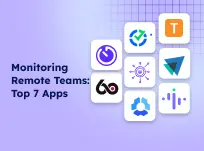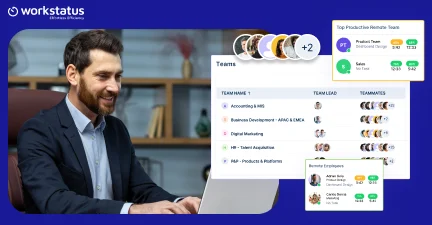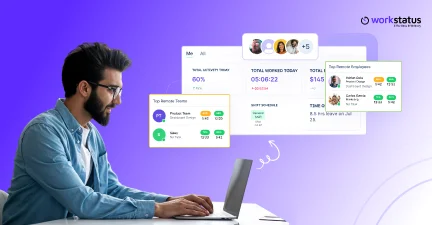Table of Contents
Is it ethical for companies to monitor employees?
It’s a question that many people are asking themselves these days, and there are likely to be differing opinions on the subject.Some believe that companies should not monitor their employees as they do not have the right to invade privacy. In contrast, others argue that monitoring can effectively prevent company secrets from being leaked or stolen.
As per Gartner, 16% of employers use employee scheduling software to monitor their employees’ activity.
Moreover, monitoring solutions are an excellent way for companies to improve their productivity, but there are still some concerns.
In this blog, we will discuss some ethical consequences of employee monitoring and provide you with some tips for maintaining employee monitoring ethics that will help you create an ethical environment in your organization.
So without any further ados, let’s Get Started.
Ethical And Unethical Concerns For Employee Monitoring
-
Monitoring Employees In Secret

In the past, employee monitoring was a practical way to ensure that information didn’t leak from inside a company. However, this is not the case in today’s time, employers who monitor employees without their knowledge or consent can get into significant trouble.
- With high-tech surveillance and hacking, it may not be as easy to monitor employees without their knowledge in today’s modern world.
- Many people argue that companies already have too much access to the personal data of their customers and clients, which places a person’s security and privacy at risk.
- Employees feel betrayed by employers they trust with all aspects of life, only to learn later how they are monitored.
- It can even ultimately lead to the breakdown of a company as it causes staff morale and productivity levels to drop.
The most excellent way to avoid this is by always having your employees aware of when you’re going to monitor them and to ensure they are comfortable with the practice.
————————————————————————————————————————————
Also read: 11 Remote Working Tips To keep Remote Employees Engaged and Productive
————————————————————————————————————————————
-
Monitoring Employees Outside Of Working Hours
The after-hours monitoring of employees is a massive problem in the work-from-home environment. Plus, it’s not uncommon for employees to use their laptops when on break or at the end of their shift, and if you’re using employee monitoring software during these hours, you can get yourself into trouble.
The most excellent way to avoid this is to either allow employees to turn off their trackers while they’re on a break and at home or simply create a policy that states employees cannot be monitored outside of working hours.
-
Collecting Personal Data Through Monitoring Software
Though employee monitoring software can help employers monitor the usage of devices and programs, they should also be mindful that they are not collecting too much personal data. Personal data includes anything such as browsing history or emails – information that belongs to the employee in question and should be protected under strict privacy laws.
The best way to avoid this issue is to have a policy specifying what type of data can be collected through your tracking system, ensuring that you only collect company-related and work-related data only.
-
Collecting Data But Not For Business Improvement.
The ethical use of employee monitoring software is a lot more than simply the ways you collect data from employees. It also involves how they’re being used. Like, If you are using it for business improvement, then it’s okay. But if you are using it like other things(spying on your employees), you are wasting your time.
Ensure that the data collected is only used for what you have declared to be purposeful and beneficial for the organization. That way, you can make sure that your employees are never exploited or put in negative positions by any of these monitoring activities.
Major Ethical Consequences Of Employee Monitoring
-
Breach Of Privacy & Personal Data

Monitoring employees without their consent is an invasion of privacy. Not only is it against company policy, but some people feel that monitoring employees mean you’re not respecting them as individuals.
Even if they violate your policies (like lying about sick days), using technology to monitor them continuously may be crossing a line. Some companies choose to draw a line between life and work, while others expect workers to separate life from work.
So, when in doubt, get permission first. This way, everyone’s clear and respectful of each other’s boundaries and rules. It also ensures no one feels like they’ve been spied on or treated unfairly or disrespectfully at work—which can build morale and improve productivity at little cost.
-
Reduces Employee Morale & Trust
It can be intimidating for employees when they know their actions are being monitored, mainly if there isn’t transparency in collecting or using data.According to Cisco, monitoring can make employees feel like they aren’t trusted.
This loss of trust can result in an inability of an employee to perform at optimal levels, hurting their productivity and potentially your bottom line.
Moreover, if workers don’t trust that their organization is respecting their privacy, they are more likely to leave.
So to ensure trust, make sure that you discuss monitoring policies with your team and explain the security measures in place to safeguard each employee’s data privacy.
———————————————————————————————————————–
Also read: Employee Monitoring & Data Confidentiality Practices
———————————————————————————————————————–
Tips To Maintain Employee Monitoring Ethics
-
Create A Standard Employee Monitoring Policy
The initial step for ethical employee monitoring is to create a detailed policy with your company’s help. Here are some things you should include:
=> Reasons why you will be tracking employees; what tools/solutions can you use?
=> What will you monitor; emails and private messages, work screens, social media account updates, or browsing history.
=> Type of monitor you will use audio, video, or digital monitoring.
=> The total number of hours you will going to monitor the employees, and whether it be during working hours only or after working hours too
-
Adhere To Country & State Laws

While creating an employee monitoring ethics and policy, you must follow the national and state labor and privacy laws to avoid extensive unethical issues. For instance, an employer can monitor their employees’ company devices in the US, but checking their emails is a big NO.
That’s why it is important to be familiar with the laws that govern employee monitoring in your country and state, as it can greatly contribute to creating an effective monitoring policy.
-
Help Employees Understand The Need For Monitoring
Before you can monitor their actions, employees must understand your expectations and why they’re essential. Explain what you’re monitoring and why, be clear about how it will help them do their jobs better, and invite input from everyone on what data is most valuable.
Doing so will make compliance with company policies less like a burden and more like a value-added feature of work life.
-
Use A Secure Employee Monitoring & Productivity Tool
To get the most out of employee monitoring, you need a secure and reliable tool. Look for software with built-in security measures that won’t compromise sensitive data, as well as features designed to boost productivity, like project tracking and detailed reporting capabilities.
With the right tool in place, you can trust that your employees are productive and compliant without having to micromanage every single task they do.
You can use
Workstatus, The One-Stop Solution For Employee Monitoring.
Workstatus is a secure and reliable productivity tool that offers features such as time tracking, project management, activity monitoring and detailed reporting capabilities, and detailed reporting capabilities.
It also offers built-in security measures that ensure your employee data is secure while at the same time offering features to help boost productivity. With Workstatus in place, you can trust that your employees are productive and compliant without having to micromanage them every step of the way.
You can try out the Workstatus for 7 days free trial with no commitment and without any hidden charges.
With all these features, Workstatus is an excellent choice for all kinds of businesses.
Final Take
So it was all about whether it’s ethical to monitor employees or not. By following the steps to maintain this type of monitoring, you’ll be able to reap all the rewards that come with it.
For instance, by using a tool like employee monitoring software or social media monitoring tools that don’t violate any laws and boost productivity, your organization can see improvements in morale and trust among employees at little cost.So, which step has been most valuable for you?
Let us know plus what other needs we should address related to your query.
I hope you have found the blog exciting and insightful.
Thank you for Reading!
Sign Up for Free or Book a Demo!
FAQs
Q- Does employee monitoring improve productivity?
Answer: Yes, employee monitoring can improve productivity. By tracking key performance indicators such as time spent on tasks, total tasks completed, milestones accomplished, and other relevant metric, you can gain insight into how employees are using their time and identify any inefficiencies or areas for improvement.
Additionally, making sure employees are aware that they’re being monitored may increase accountability and encourage them to work more efficiently, leading to better overall task completion rates.
Q- Can I monitor employees remotely?
Answer: Yes, you can monitor employees remotely using a variety of tools and techniques. For example, time-tracking software allows you to track how long an employee spends on each task and the status of those tasks.
Additionally, you can use video conferencing solutions such as Zoom or Skype to observe employee activities while they’re working from home or other remote locations, making it easy for you to stay connected and monitor employee performance for complete visibility.












